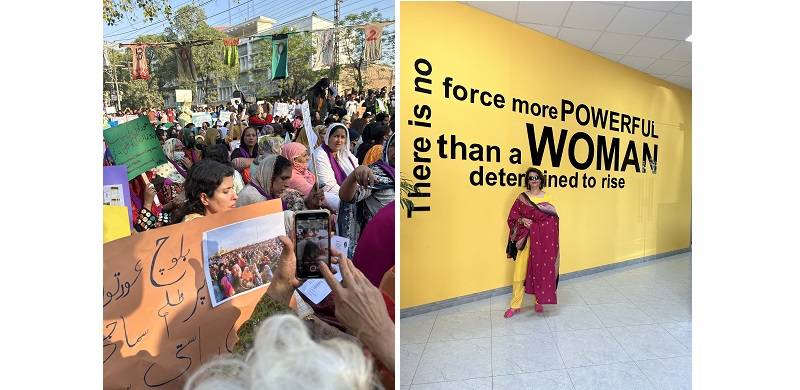
So it’s been a few weeks since my return to NY from Pakistan, that first and forever home, which I hadn’t visited since the outbreak of the pandemic in March 2021. I’d been in Lahore then, getting frantic calls from my Fulbright officer to board the next plane out and get back “home” to the US, “safe” from all manner of deadly ills associated in the imperial imaginary with the Other out there.
“Be safe!” is a refrain I hear often as I announce to colleagues, friends and family that I’m about to embark for the motherland. It irks me no end, given its orientalist overtones. Never mind that this time things seemed— according to all media pundits here, there, everywhere — worse than ever, what with the Land of the Pure in default, the IMF breathing down its neck with its SAP quid pro quos designed to worsen the economic injustices that continue to deepen the gap between those who ride around in fancy cars and those who ride atop buses when they can muster a few rupees.
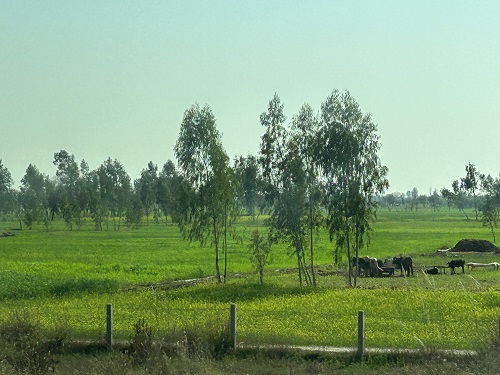 The real fear folks had — have — is the deep split in the citizenry engendered by the erstwhile and ousted PM Imran Khan and the Army who he’d once importuned for the prime ministership but against whom he turned once the chips were down and he with his assiduously cultivated incorruptible image became a liability to their unilateral hold on the reigns of power. With the US not far behind as master manipulator of all machinations unfolding on the Pakistani stage, it has been quite easy for IK and his followers to hoist the petard of Western imperial interference on which to impale their opponents. The multiple ironies in this scenario and issuing out of the mouth of the erstwhile playboy of the Western world are eye-rolling-ly delicious but also downright dangerous.
The real fear folks had — have — is the deep split in the citizenry engendered by the erstwhile and ousted PM Imran Khan and the Army who he’d once importuned for the prime ministership but against whom he turned once the chips were down and he with his assiduously cultivated incorruptible image became a liability to their unilateral hold on the reigns of power. With the US not far behind as master manipulator of all machinations unfolding on the Pakistani stage, it has been quite easy for IK and his followers to hoist the petard of Western imperial interference on which to impale their opponents. The multiple ironies in this scenario and issuing out of the mouth of the erstwhile playboy of the Western world are eye-rolling-ly delicious but also downright dangerous.
Worsening this scenario of civilian unrest is the return of the repressed: that is, thanks to the recklessly unthought-through departure of US forces from next door Afghanistan, the death and destruction wrought there with the Taliban once again in power, has obviously filtered back across Pakistan’s northwest border and terrorist attacks and bombings in KP and further afield have been increasing over the past year (see my article about one such incident that occurred while I was visiting Karachi on the first leg of my trip.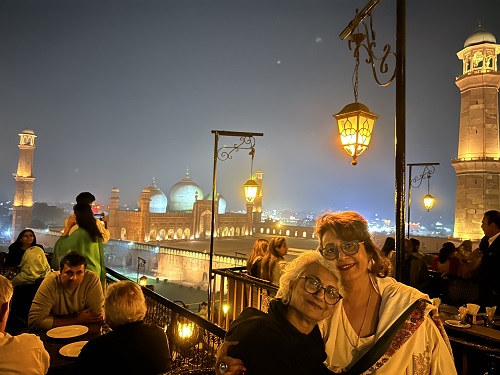
All the above aside — and the “danger” factor all around (where is it safe???) notwithstanding — Pakistan is an amazingly vibrant place, where all manner of futures feel possible, even if improbable.
One such future might be that sketched out in a very different New York milieu of progressive queer activism that the late Cuban American academic Jose Esteban Munoz inhabited and sought to make ever more accessible and equitable for queers of colour within the imperium. “Queer futurity” as he dubbed it, was a call for the not-here-yet to start inhering in the Now, the future becoming manifest right here in our present tense state, and therefore not somewhere over the proverbial rainbow, beckoning with hollow promises for better tomorrows.
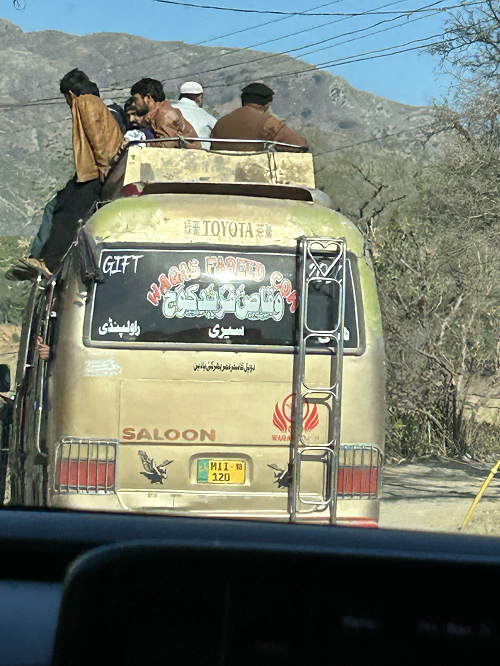 In a place/time- Pakistan — that seems so outwardly different to 1990s NYC of Estaban’s provenance — it seems startlingly strange, inviting all manner of raised academic eyebrows, to claim a similarity of concerns being enacted through the radical interventions dotting that Islamist country’s landscape in ways the “liberal” West might be astonished at.
In a place/time- Pakistan — that seems so outwardly different to 1990s NYC of Estaban’s provenance — it seems startlingly strange, inviting all manner of raised academic eyebrows, to claim a similarity of concerns being enacted through the radical interventions dotting that Islamist country’s landscape in ways the “liberal” West might be astonished at.
And yet….. in Karachi’s lower middle class neighborhood of Nazimabad, a young Assistant Commissioner is winning the hearts and minds of his electorate because he is delivering on promises to repair crumbling infrastructure and provide amenities where none or few exist; and people love him inspite — or could it be because of? — his androgynous appearance and behaviour, with the haters taunting him as trans, as effeminate, as a “she-male.”
His response: a short speech that went viral on Instagram, denying he is trans, but saying he supports and applauds women workers and the trans and queer communities for being true to themselves, for being workers who support their families, for not backing down in the face of prejudice and discrimination but fighting for their rights.
In Islamabad — where the mornings were still chilly and where my arrival from Karachi on the second leg of my trip, at my mum’s childhood bestie aunty Mahgul’s welcoming home, was greeted by an out-of-the-blue hailstorm! — I spent a wonderful few days enjoying the beautiful capital surrounded by the picturesque Margalla Hills as I went about my various activities. These included attending a fabulous qawwali nite at the Pakistan National Council of the Arts curated by the knowledgeable cultural critic Ally Adnan, a comrade from the US diaspora; as well a rich, long interview session with filmmaker Saqib Malik, whose 2019 film Baaji starred the inimitable Lollywood star Reema, who in the film, delineates the material space of a queer icon, one whose image the film seeks to rehabilitate both in “real” life and on the celluloid screen.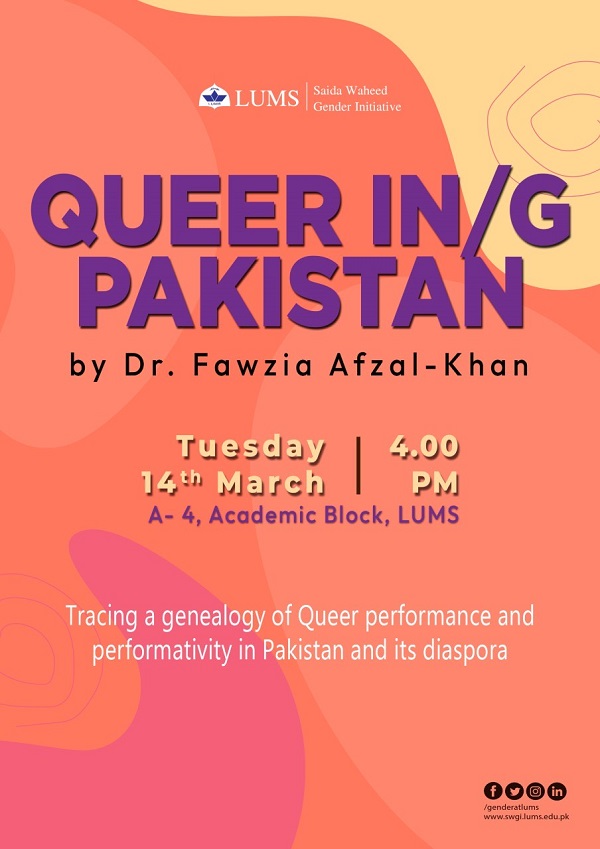
On the bus journey from Islamabad to Lahore a few days later, I was enamoured of the bucolic scenes flashing past my window, green stretches on either side of the highway that sadly are under threat by various “developers” hell-bent on transforming agricultural land into concrete jungles. I knew I was romanticising the farmers’ lives, glimpsed in passing from the perch of a luxury bus, connecting one metropolis to another. But the unhurried look of little by-lanes, with an occasional rickshaw, motorbike or small tractor the only motorised vehicles winding their way in the wide open farmland, and occasional gaggles of colourfully dressed women walking by, some working the fields alongside men, planting, reaping, gathering firewood…. Oh it did charm me and made me wonder why Pakistan as a developing post colonial state didn’t mandate service in the countryside like post revolutionary Cuba did under Castro. City-dwelling white collar-enamoured youth like me would have benefited enormously and the country might have taken a different turn….
And finally…. Crossing the dried up Ravi river bed, a sad ecological disaster made worse by government neglect and corruption…and into the city of Lahore, my birthplace, teeming with noise, pollution, carsoxenrickshawsmotorbikesgailypaintedtrucks….. oh my, what a cacophony of sounds and smells, my thirsty soul lapping it all up greedily.
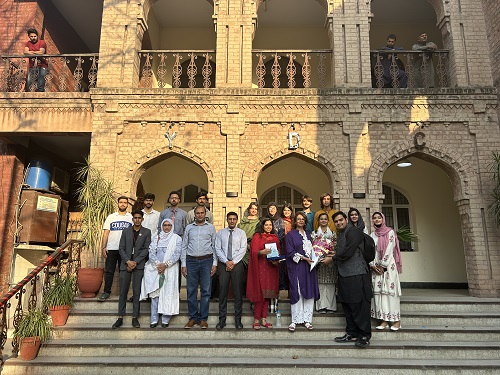 Spring was in the air as my dear friend FQ’s sweet young driver Waqas drove me from the bus stop where I alighted after a precise four-and-a-half-hour journey, to my hostess’s lovely home where I’d reside in comfort for the next three weeks.
Spring was in the air as my dear friend FQ’s sweet young driver Waqas drove me from the bus stop where I alighted after a precise four-and-a-half-hour journey, to my hostess’s lovely home where I’d reside in comfort for the next three weeks.
The days rushed by in frantically paced activity. I started by knocking out (together with my co-writer) the first draft of two of the three remaining acts of the three-act play on British spy TE Lawrence’s time undercover in Lahore during the late 1920s, which Pakistan’s leading playwright Shahid Nadeem and I have been working on collaboratively for a number of years. With some of the work I’d intended to do under my belt, I allowed myself to enjoy a three-day side trip to Khanpur dam with my friend FQ, in the company of two other women, where we ate, rode jet skis, and parasailed in stunning surroundings, singing and dancing each nite around the outdoor fire pit. Returning to Lahore via Taxila, I was reminded of the centuries-old history of this part of the world, the countryside dotted with ancient monasteries built by the early wandering ascetics of North India following in the footsteps of the Buddha. This is the Pakistani palimpsest, which we forget at our peril….
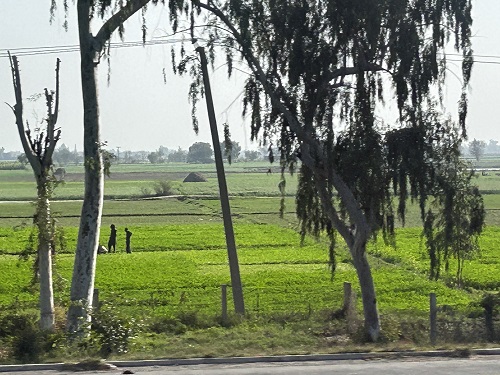 In Lahore once again, days melted into nights full of music and the fragrance of budding jasmine in spring…whilst the days became a blur of cultural and political activity ranging from the Lahore Literary Festival to the almost-banned Aurat March and during my final few days, the police action on Imran Khan’s house in Zaman Park and the ensuing disruptions of law and (dis) order. Interspersed with all these were a series of lectures that I was invited to give at some of my Alma maters which introduced me to the next generation of students, eager to learn and full of curiosity about the rapidly changing world around them. I was awed by their open-minded enthusiasm that gives the lie to the canard about religious regressiveness as pervasive among Pakistani youth tout court. And I was similarly thrilled to meet and interview at length the playwright of several of the most openly queer dramas and TV serials to command devoted audiences from across class spectrums starting in the decade of 2010 and continuing in to the present. What does that tell you about Pakistan and its creative talent, as well as audiences who lapped up the queer upturning of all norms celebrated with humour in the now-legendary Quddusi Sahib ki Bewah that ran from 2012-2014 and for a whopping 155 episodes?!!
In Lahore once again, days melted into nights full of music and the fragrance of budding jasmine in spring…whilst the days became a blur of cultural and political activity ranging from the Lahore Literary Festival to the almost-banned Aurat March and during my final few days, the police action on Imran Khan’s house in Zaman Park and the ensuing disruptions of law and (dis) order. Interspersed with all these were a series of lectures that I was invited to give at some of my Alma maters which introduced me to the next generation of students, eager to learn and full of curiosity about the rapidly changing world around them. I was awed by their open-minded enthusiasm that gives the lie to the canard about religious regressiveness as pervasive among Pakistani youth tout court. And I was similarly thrilled to meet and interview at length the playwright of several of the most openly queer dramas and TV serials to command devoted audiences from across class spectrums starting in the decade of 2010 and continuing in to the present. What does that tell you about Pakistan and its creative talent, as well as audiences who lapped up the queer upturning of all norms celebrated with humour in the now-legendary Quddusi Sahib ki Bewah that ran from 2012-2014 and for a whopping 155 episodes?!!
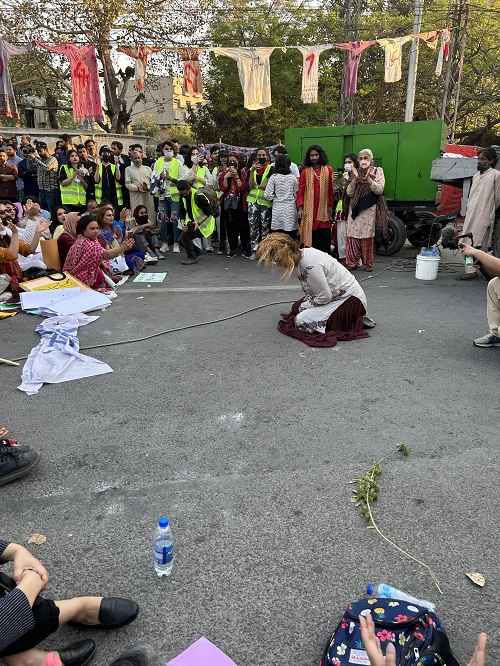 Amongst the highlights of the LLF was attending Zulfiqar Ali Bhutto Jr’s queer-themed visual art retrospective entitled “Tomorrow We Inherit the Earth” at a newly-opened art gallery in Lahore called Como.
Amongst the highlights of the LLF was attending Zulfiqar Ali Bhutto Jr’s queer-themed visual art retrospective entitled “Tomorrow We Inherit the Earth” at a newly-opened art gallery in Lahore called Como.
Indeed, it was this feeling of a queer futurity that opens up the multiple and variegated possibilities of love and solidarity that are the need of the day if Pakistan is to be saved from its own most regressively normative impulses, which rendered this critical, even apocalyptic artistic gaze, a hopeful intervention in the sphere of cultural discourse where imperial and colonial spectres remain haunting presences one has to work hard and with vigilance to deconstruct.
And that same criticality infused the optimism of the Aurat March (Women’s March) and marchers, all participants envisioning, nay demanding, juster, more equitable and ecologically sustainable futures for all living species and citizens female, male, trans, non binary.
It was this queering of discursive space and the undoing of it’s attendant temporality (a temporality unable to link past and present in any meaningful combination of a here-and-now futurity) — that the Aurat March on International Women’s Day, instantiated through its songs, visual representations and other public performances that included a strong trans MTF presence onstage and in the marching crowd. Along with its now-hallmark statement “Mera jisam meri marzi” (my body, my choice) — that has driven its opponents on the right into frenzied oppositional displays of a counter-piety via the “Haya” (Modesty) March, which the cowardly state sanctions each year (this year being no exception), whilst it tries to come up with all manner of reasons to “ban” the Aurat March — the large and vociferous Trans turnout infuriated the religious lobby and its adherents.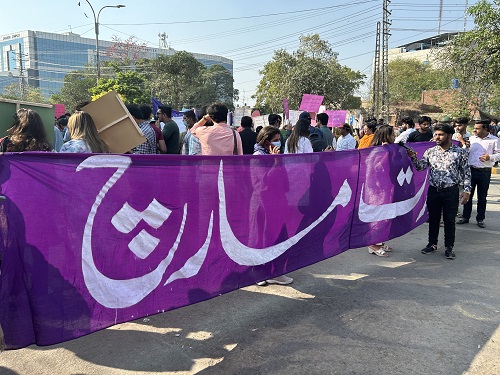
Certainly in Lahore where I attended the march (it took my friend and me two-and-a-half hours to get to the location at the Press Club where it was to commence (thanks in no small part to the political unraveling occurring at Zaman Park) — the solidarity between the cisgender and trans women’s contingent was on full display via inclusionary speeches, songs, dances, theatrical performances. And despite attempts by some at intimidation and even violence, the march concluded peacefully and successfully with an iteration of broad demands that linked together women’s rights with trans and lgbt rights, environmental and animal rights with those of working class and minority women, men, non binary folk representing all sexual categories.
To then attend a full-day workshop a few days later at Shirkat Gah, a leading and well established NGO working on behalf of the secular women’s and human rights movement in Pakistan since the 1980s, drove home to me the insight that indeed, Pakistan is at an exciting conjunctural moment, one where younger generation secular feminists raised in the full consciousness of intersectional feminist solidarity cutting across the sex/gender/class/caste/colour spectrum, are exchanging views on theory and praxis with the pioneering generation of Pakistani feminists of the Women’s Action Forum. It therefore made perfect sense that one of the leaders of this new wave of feminists is the trans activist Mehlab Jameel, a researcher and community educator who helped draft Pakistan's landmark 2018 Transgender Persons Act that accorded protections and the right to self-identify as trans to members of this community.
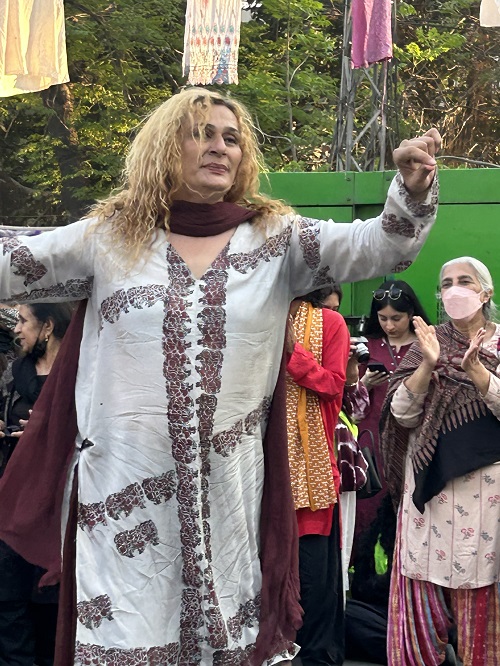 Of course, though that bill was passed by the Pakistani legislature in 2018, it has not gone unchallenged, with attacks against its legitimacy by the religious lobby and its “moral majority” increasing in the public sphere this past year.
Of course, though that bill was passed by the Pakistani legislature in 2018, it has not gone unchallenged, with attacks against its legitimacy by the religious lobby and its “moral majority” increasing in the public sphere this past year.
But the point to be noted here is that this is precisely what democracy in action looks like! Notwithstanding the outsize role of the Pakistani army in affairs of state (though in the wake of IK’s challenges this role is likely/hopefully to be severely diminished) — the fact remains that a contentious public sphere is very much a defining characteristic of a robust democracy!
And thus, though several bad actors including a professor at one of the universities in lahore where I was scheduled to give a talk on my latest research entitled, “Queer In/g Pakistan,” tried to throw a wrench in the spanner, dubbing my talk and others in the same workshop series on "Queer Futures" a species of obscenity and against the moral fabric of Pakistani society, the talk was not cancelled. On a twitter thread here is a similar comment from someone else claiming “LUMS is always in the news for all the wrong reasons and this one tops all..Queer workshops and talks? Disgusted absolutely disgusted.”
However, despite such bigoted displays of rancour, not only did all events and lectures in the “Queer Futures” study group occur without incidence, but were very well attended by students and faculty who exhibited a great deal of open minded interest in tracking the exciting debates in this field of intellectual inquiry.
Thanks to the brilliance and courage of queer and trans activists and performance artists in Pakistan who are creating many innovative venues to share their stories and visiblise their resistance to heteronormative patriarchal neoliberal hegemonic structures that work to no one’s benefit except those at the highest echelons of power and wealth— I came away from my visit with ever increasing respect for all those engaged in these struggles for new imaginaries.
From filmmaker Bilal Lashari’s queer take on the iconically masculinist Punjabi film of the 1980s, Maula Jat, about which we chatted at length at midnight one evening in Lahore, to the bold and beautiful Jaan-I-Haseena’s Zanan Khana venture creating digital safe spaces for queer and trans youth, to their collaboration with other trans leaders like the fabulous Dr Mehrub Awan (of Phudina Chutney fame) in creating and leading the first indigenous Moorat March for trans rights in Sindh in 2022, to the recently concluded ScrapFest that took place online despite being forcibly cancelled by the authorities — there is much to feel awed and optimistic about, regarding Pakistan.
I can’t wait to return and resume the connections I’ve established on this recent visit, digging deeper under the surface of a superficial normativity that belies what lies beneath, waiting to erupt into all the colors of a rainbow in the here and now of queer futurity.
“Be safe!” is a refrain I hear often as I announce to colleagues, friends and family that I’m about to embark for the motherland. It irks me no end, given its orientalist overtones. Never mind that this time things seemed— according to all media pundits here, there, everywhere — worse than ever, what with the Land of the Pure in default, the IMF breathing down its neck with its SAP quid pro quos designed to worsen the economic injustices that continue to deepen the gap between those who ride around in fancy cars and those who ride atop buses when they can muster a few rupees.
 The real fear folks had — have — is the deep split in the citizenry engendered by the erstwhile and ousted PM Imran Khan and the Army who he’d once importuned for the prime ministership but against whom he turned once the chips were down and he with his assiduously cultivated incorruptible image became a liability to their unilateral hold on the reigns of power. With the US not far behind as master manipulator of all machinations unfolding on the Pakistani stage, it has been quite easy for IK and his followers to hoist the petard of Western imperial interference on which to impale their opponents. The multiple ironies in this scenario and issuing out of the mouth of the erstwhile playboy of the Western world are eye-rolling-ly delicious but also downright dangerous.
The real fear folks had — have — is the deep split in the citizenry engendered by the erstwhile and ousted PM Imran Khan and the Army who he’d once importuned for the prime ministership but against whom he turned once the chips were down and he with his assiduously cultivated incorruptible image became a liability to their unilateral hold on the reigns of power. With the US not far behind as master manipulator of all machinations unfolding on the Pakistani stage, it has been quite easy for IK and his followers to hoist the petard of Western imperial interference on which to impale their opponents. The multiple ironies in this scenario and issuing out of the mouth of the erstwhile playboy of the Western world are eye-rolling-ly delicious but also downright dangerous.Worsening this scenario of civilian unrest is the return of the repressed: that is, thanks to the recklessly unthought-through departure of US forces from next door Afghanistan, the death and destruction wrought there with the Taliban once again in power, has obviously filtered back across Pakistan’s northwest border and terrorist attacks and bombings in KP and further afield have been increasing over the past year (see my article about one such incident that occurred while I was visiting Karachi on the first leg of my trip.

All the above aside — and the “danger” factor all around (where is it safe???) notwithstanding — Pakistan is an amazingly vibrant place, where all manner of futures feel possible, even if improbable.
One such future might be that sketched out in a very different New York milieu of progressive queer activism that the late Cuban American academic Jose Esteban Munoz inhabited and sought to make ever more accessible and equitable for queers of colour within the imperium. “Queer futurity” as he dubbed it, was a call for the not-here-yet to start inhering in the Now, the future becoming manifest right here in our present tense state, and therefore not somewhere over the proverbial rainbow, beckoning with hollow promises for better tomorrows.
 In a place/time- Pakistan — that seems so outwardly different to 1990s NYC of Estaban’s provenance — it seems startlingly strange, inviting all manner of raised academic eyebrows, to claim a similarity of concerns being enacted through the radical interventions dotting that Islamist country’s landscape in ways the “liberal” West might be astonished at.
In a place/time- Pakistan — that seems so outwardly different to 1990s NYC of Estaban’s provenance — it seems startlingly strange, inviting all manner of raised academic eyebrows, to claim a similarity of concerns being enacted through the radical interventions dotting that Islamist country’s landscape in ways the “liberal” West might be astonished at.And yet….. in Karachi’s lower middle class neighborhood of Nazimabad, a young Assistant Commissioner is winning the hearts and minds of his electorate because he is delivering on promises to repair crumbling infrastructure and provide amenities where none or few exist; and people love him inspite — or could it be because of? — his androgynous appearance and behaviour, with the haters taunting him as trans, as effeminate, as a “she-male.”
His response: a short speech that went viral on Instagram, denying he is trans, but saying he supports and applauds women workers and the trans and queer communities for being true to themselves, for being workers who support their families, for not backing down in the face of prejudice and discrimination but fighting for their rights.
In Lahore once again, days melted into nights full of music and the fragrance of budding jasmine in spring…whilst the days became a blur of cultural and political activity
In Islamabad — where the mornings were still chilly and where my arrival from Karachi on the second leg of my trip, at my mum’s childhood bestie aunty Mahgul’s welcoming home, was greeted by an out-of-the-blue hailstorm! — I spent a wonderful few days enjoying the beautiful capital surrounded by the picturesque Margalla Hills as I went about my various activities. These included attending a fabulous qawwali nite at the Pakistan National Council of the Arts curated by the knowledgeable cultural critic Ally Adnan, a comrade from the US diaspora; as well a rich, long interview session with filmmaker Saqib Malik, whose 2019 film Baaji starred the inimitable Lollywood star Reema, who in the film, delineates the material space of a queer icon, one whose image the film seeks to rehabilitate both in “real” life and on the celluloid screen.

On the bus journey from Islamabad to Lahore a few days later, I was enamoured of the bucolic scenes flashing past my window, green stretches on either side of the highway that sadly are under threat by various “developers” hell-bent on transforming agricultural land into concrete jungles. I knew I was romanticising the farmers’ lives, glimpsed in passing from the perch of a luxury bus, connecting one metropolis to another. But the unhurried look of little by-lanes, with an occasional rickshaw, motorbike or small tractor the only motorised vehicles winding their way in the wide open farmland, and occasional gaggles of colourfully dressed women walking by, some working the fields alongside men, planting, reaping, gathering firewood…. Oh it did charm me and made me wonder why Pakistan as a developing post colonial state didn’t mandate service in the countryside like post revolutionary Cuba did under Castro. City-dwelling white collar-enamoured youth like me would have benefited enormously and the country might have taken a different turn….
And finally…. Crossing the dried up Ravi river bed, a sad ecological disaster made worse by government neglect and corruption…and into the city of Lahore, my birthplace, teeming with noise, pollution, carsoxenrickshawsmotorbikesgailypaintedtrucks….. oh my, what a cacophony of sounds and smells, my thirsty soul lapping it all up greedily.
 Spring was in the air as my dear friend FQ’s sweet young driver Waqas drove me from the bus stop where I alighted after a precise four-and-a-half-hour journey, to my hostess’s lovely home where I’d reside in comfort for the next three weeks.
Spring was in the air as my dear friend FQ’s sweet young driver Waqas drove me from the bus stop where I alighted after a precise four-and-a-half-hour journey, to my hostess’s lovely home where I’d reside in comfort for the next three weeks.The days rushed by in frantically paced activity. I started by knocking out (together with my co-writer) the first draft of two of the three remaining acts of the three-act play on British spy TE Lawrence’s time undercover in Lahore during the late 1920s, which Pakistan’s leading playwright Shahid Nadeem and I have been working on collaboratively for a number of years. With some of the work I’d intended to do under my belt, I allowed myself to enjoy a three-day side trip to Khanpur dam with my friend FQ, in the company of two other women, where we ate, rode jet skis, and parasailed in stunning surroundings, singing and dancing each nite around the outdoor fire pit. Returning to Lahore via Taxila, I was reminded of the centuries-old history of this part of the world, the countryside dotted with ancient monasteries built by the early wandering ascetics of North India following in the footsteps of the Buddha. This is the Pakistani palimpsest, which we forget at our peril….
Pakistan is at an exciting conjunctural moment, one where younger generation secular feminists raised in the full consciousness of intersectional feminist solidarity cutting across the sex/gender/class/caste/colour spectrum, are exchanging views on theory and praxis with the pioneering generation of Pakistani feminists of the Women’s Action Forum
 In Lahore once again, days melted into nights full of music and the fragrance of budding jasmine in spring…whilst the days became a blur of cultural and political activity ranging from the Lahore Literary Festival to the almost-banned Aurat March and during my final few days, the police action on Imran Khan’s house in Zaman Park and the ensuing disruptions of law and (dis) order. Interspersed with all these were a series of lectures that I was invited to give at some of my Alma maters which introduced me to the next generation of students, eager to learn and full of curiosity about the rapidly changing world around them. I was awed by their open-minded enthusiasm that gives the lie to the canard about religious regressiveness as pervasive among Pakistani youth tout court. And I was similarly thrilled to meet and interview at length the playwright of several of the most openly queer dramas and TV serials to command devoted audiences from across class spectrums starting in the decade of 2010 and continuing in to the present. What does that tell you about Pakistan and its creative talent, as well as audiences who lapped up the queer upturning of all norms celebrated with humour in the now-legendary Quddusi Sahib ki Bewah that ran from 2012-2014 and for a whopping 155 episodes?!!
In Lahore once again, days melted into nights full of music and the fragrance of budding jasmine in spring…whilst the days became a blur of cultural and political activity ranging from the Lahore Literary Festival to the almost-banned Aurat March and during my final few days, the police action on Imran Khan’s house in Zaman Park and the ensuing disruptions of law and (dis) order. Interspersed with all these were a series of lectures that I was invited to give at some of my Alma maters which introduced me to the next generation of students, eager to learn and full of curiosity about the rapidly changing world around them. I was awed by their open-minded enthusiasm that gives the lie to the canard about religious regressiveness as pervasive among Pakistani youth tout court. And I was similarly thrilled to meet and interview at length the playwright of several of the most openly queer dramas and TV serials to command devoted audiences from across class spectrums starting in the decade of 2010 and continuing in to the present. What does that tell you about Pakistan and its creative talent, as well as audiences who lapped up the queer upturning of all norms celebrated with humour in the now-legendary Quddusi Sahib ki Bewah that ran from 2012-2014 and for a whopping 155 episodes?!! Amongst the highlights of the LLF was attending Zulfiqar Ali Bhutto Jr’s queer-themed visual art retrospective entitled “Tomorrow We Inherit the Earth” at a newly-opened art gallery in Lahore called Como.
Amongst the highlights of the LLF was attending Zulfiqar Ali Bhutto Jr’s queer-themed visual art retrospective entitled “Tomorrow We Inherit the Earth” at a newly-opened art gallery in Lahore called Como.Indeed, it was this feeling of a queer futurity that opens up the multiple and variegated possibilities of love and solidarity that are the need of the day if Pakistan is to be saved from its own most regressively normative impulses, which rendered this critical, even apocalyptic artistic gaze, a hopeful intervention in the sphere of cultural discourse where imperial and colonial spectres remain haunting presences one has to work hard and with vigilance to deconstruct.
And that same criticality infused the optimism of the Aurat March (Women’s March) and marchers, all participants envisioning, nay demanding, juster, more equitable and ecologically sustainable futures for all living species and citizens female, male, trans, non binary.
It was this queering of discursive space and the undoing of it’s attendant temporality (a temporality unable to link past and present in any meaningful combination of a here-and-now futurity) — that the Aurat March on International Women’s Day, instantiated through its songs, visual representations and other public performances that included a strong trans MTF presence onstage and in the marching crowd. Along with its now-hallmark statement “Mera jisam meri marzi” (my body, my choice) — that has driven its opponents on the right into frenzied oppositional displays of a counter-piety via the “Haya” (Modesty) March, which the cowardly state sanctions each year (this year being no exception), whilst it tries to come up with all manner of reasons to “ban” the Aurat March — the large and vociferous Trans turnout infuriated the religious lobby and its adherents.

Certainly in Lahore where I attended the march (it took my friend and me two-and-a-half hours to get to the location at the Press Club where it was to commence (thanks in no small part to the political unraveling occurring at Zaman Park) — the solidarity between the cisgender and trans women’s contingent was on full display via inclusionary speeches, songs, dances, theatrical performances. And despite attempts by some at intimidation and even violence, the march concluded peacefully and successfully with an iteration of broad demands that linked together women’s rights with trans and lgbt rights, environmental and animal rights with those of working class and minority women, men, non binary folk representing all sexual categories.
To then attend a full-day workshop a few days later at Shirkat Gah, a leading and well established NGO working on behalf of the secular women’s and human rights movement in Pakistan since the 1980s, drove home to me the insight that indeed, Pakistan is at an exciting conjunctural moment, one where younger generation secular feminists raised in the full consciousness of intersectional feminist solidarity cutting across the sex/gender/class/caste/colour spectrum, are exchanging views on theory and praxis with the pioneering generation of Pakistani feminists of the Women’s Action Forum. It therefore made perfect sense that one of the leaders of this new wave of feminists is the trans activist Mehlab Jameel, a researcher and community educator who helped draft Pakistan's landmark 2018 Transgender Persons Act that accorded protections and the right to self-identify as trans to members of this community.
 Of course, though that bill was passed by the Pakistani legislature in 2018, it has not gone unchallenged, with attacks against its legitimacy by the religious lobby and its “moral majority” increasing in the public sphere this past year.
Of course, though that bill was passed by the Pakistani legislature in 2018, it has not gone unchallenged, with attacks against its legitimacy by the religious lobby and its “moral majority” increasing in the public sphere this past year.But the point to be noted here is that this is precisely what democracy in action looks like! Notwithstanding the outsize role of the Pakistani army in affairs of state (though in the wake of IK’s challenges this role is likely/hopefully to be severely diminished) — the fact remains that a contentious public sphere is very much a defining characteristic of a robust democracy!
And thus, though several bad actors including a professor at one of the universities in lahore where I was scheduled to give a talk on my latest research entitled, “Queer In/g Pakistan,” tried to throw a wrench in the spanner, dubbing my talk and others in the same workshop series on "Queer Futures" a species of obscenity and against the moral fabric of Pakistani society, the talk was not cancelled. On a twitter thread here is a similar comment from someone else claiming “LUMS is always in the news for all the wrong reasons and this one tops all..Queer workshops and talks? Disgusted absolutely disgusted.”
However, despite such bigoted displays of rancour, not only did all events and lectures in the “Queer Futures” study group occur without incidence, but were very well attended by students and faculty who exhibited a great deal of open minded interest in tracking the exciting debates in this field of intellectual inquiry.
Thanks to the brilliance and courage of queer and trans activists and performance artists in Pakistan who are creating many innovative venues to share their stories and visiblise their resistance to heteronormative patriarchal neoliberal hegemonic structures that work to no one’s benefit except those at the highest echelons of power and wealth— I came away from my visit with ever increasing respect for all those engaged in these struggles for new imaginaries.
From filmmaker Bilal Lashari’s queer take on the iconically masculinist Punjabi film of the 1980s, Maula Jat, about which we chatted at length at midnight one evening in Lahore, to the bold and beautiful Jaan-I-Haseena’s Zanan Khana venture creating digital safe spaces for queer and trans youth, to their collaboration with other trans leaders like the fabulous Dr Mehrub Awan (of Phudina Chutney fame) in creating and leading the first indigenous Moorat March for trans rights in Sindh in 2022, to the recently concluded ScrapFest that took place online despite being forcibly cancelled by the authorities — there is much to feel awed and optimistic about, regarding Pakistan.
I can’t wait to return and resume the connections I’ve established on this recent visit, digging deeper under the surface of a superficial normativity that belies what lies beneath, waiting to erupt into all the colors of a rainbow in the here and now of queer futurity.

